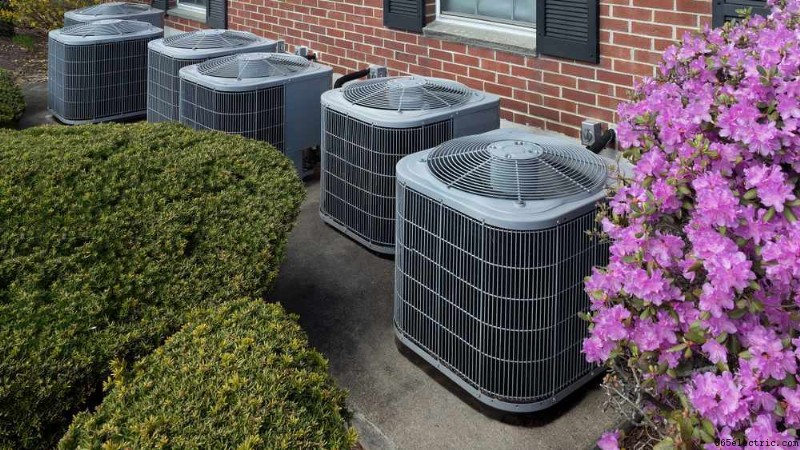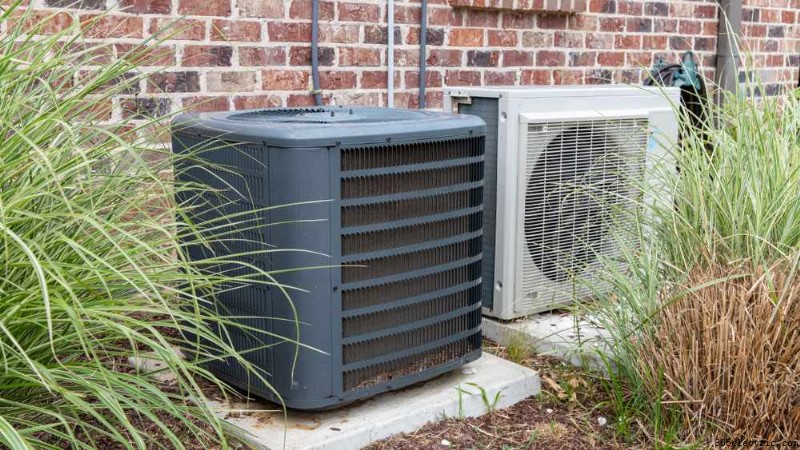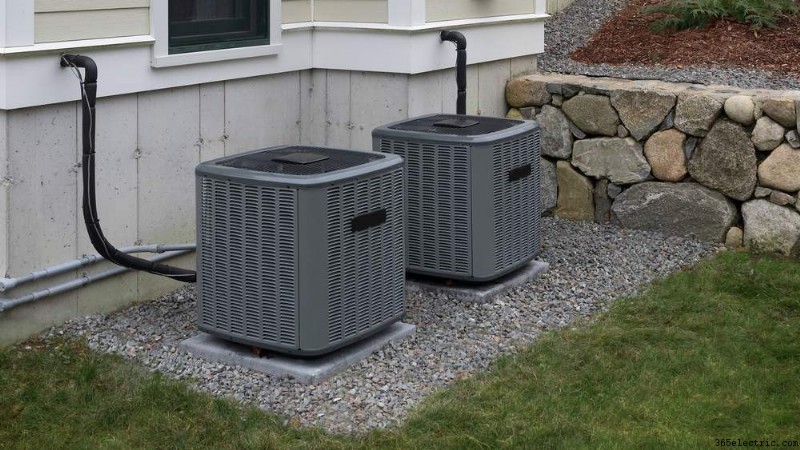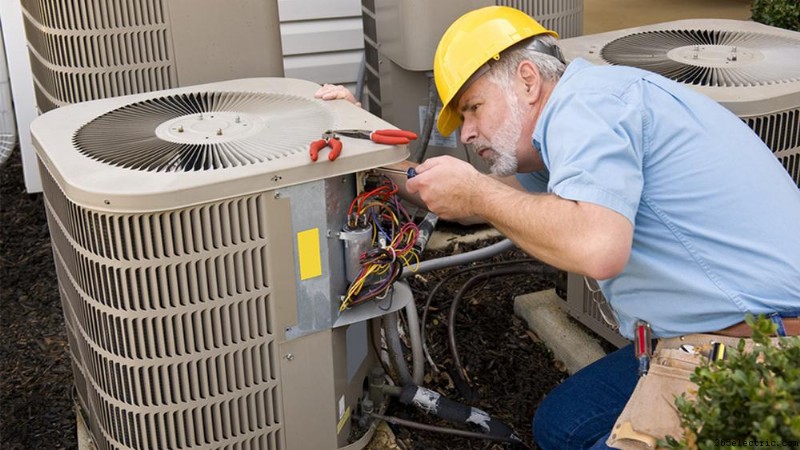
A última coisa que você quer na temporada de verão é descobrir em um dia quente e escaldante que seu ar condicionado não está funcionando. Embora alguns problemas de CA não sejam tão caros, se o motivo for a falha do compressor de CA, certamente causará um grande estrago em sua carteira.
O bom é que a maioria dos problemas são evitáveis se detectados em tempo hábil.
Compilamos uma lista extensa para ajudá-lo a diagnosticar o problema com antecedência e fornecer as etapas que você pode seguir para evitar o problema no futuro.
O que faz um compressor de CA?
Um compressor é um componente vital e é considerado o coração do seu sistema HVAC. Ele é responsável por comprimir o refrigerante, uma substância de resfriamento, para que ele possa fluir no AC e remover calor (ou ar frio no caso de ACs reversíveis).
Eles podem durar muito tempo - 10 a 15 anos se forem fornecidos com os devidos cuidados.
No entanto, a falha em manter seu AC levará a um aumento no desgaste. Poeira, detritos ou vazamentos de refrigerante têm um impacto maior no funcionamento do seu compressor AC.
Então, quando um compressor quebra, significa que você tem uma emergência HVAC! Em alguns cenários infelizes, você não poderá corrigi-lo e a substituição é a única opção.
Como funciona um compressor de ar condicionado?
O calor flui de uma área de alta temperatura para um local de baixa temperatura. Os condicionadores de ar funcionam com o mesmo princípio.
O compressor do seu ar condicionado desempenha o papel principal no processo de refrigeração. O refrigerante coleta calor do evaporador. Depois disso, ele flui para o compressor, onde diminui o volume do refrigerante e o transforma em estado líquido. Quando um refrigerante é comprimido, sua temperatura aumenta e se transforma em um gás de alta pressão. Em seguida, flui para a serpentina do condensador para liberar o calor que é liberado para fora. Em seguida, é novamente convertido em um líquido que flui para a unidade interna. O processo é repetido várias vezes para completar o ciclo do refrigerante.
Para saber mais sobre o funcionamento de um ar condicionado, leia este artigo:Como funciona um ar condicionado?
5 sinais de alerta de falha do compressor CA

O reparo ou substituição do compressor é caro e você deseja detectar qualquer problema que possa levar à falha do compressor do seu ar condicionado o mais rápido possível. Então, aqui estão cinco primeiros sinais de alerta que indicam que seu compressor está prestes a ter uma avaria:
1. Fluxo de ar fraco
O fluxo de ar reduzido é um dos primeiros sintomas de falha do compressor AC. No entanto, pode ser bastante difícil perceber isso, pois você continuará a diminuir a temperatura nos primeiros dias se sentir que sua casa não está fria o suficiente.
A melhor maneira de descobrir se o fluxo de ar é fraco é colocar as mãos sob as aberturas. Se você sentir pouco ou nenhum fluxo de ar ou sentir ar quente quando deveria estar frio, isso significa que seu ar condicionado tem um problema no compressor. Você deve entrar em contato com um profissional de HVAC imediatamente e consertá-lo.
Leia este artigo para saber mais sobre problemas de fluxo de ar HVAC.
2. Barulhos altos
Se a sua unidade HVAC começar com barulhos altos ou rosnados e você notar vibrações que a acompanham, você deve ser alertado imediatamente. Pode ser um sinal de vários problemas, e a falha do compressor AC é um deles.
Esses ruídos de CA indicam que o compressor está com problemas de partida e provavelmente falhará no futuro. O ruído de pancada também significa a falha dos componentes elétricos do compressor.
Você deve desligar imediatamente sua unidade e entrar em contato com um profissional para uma verificação completa do seu sistema.
3. Vazamento de refrigerante
Os sinais indicadores de um vazamento de refrigerante incluem fluxo de ar fraco, sons sibilantes, água ao redor de sua unidade HVAC ou formação de gelo nas bobinas do evaporador. Seria melhor resolver um vazamento de refrigerante com urgência, pois isso pode levar a vários problemas. Isso pode afetar o resfriamento do seu sistema e causar falhas no compressor a longo prazo. A manutenção mensal pode ajudar na detecção precoce de vazamentos de refrigerante antes que ele tenha a chance de danificar seu compressor.
4. Altas contas de eletricidade
Se o seu compressor AC tiver que trabalhar mais para resfriar sua casa, ele consumirá mais energia e funcionará com mais frequência, aumentando drasticamente suas contas de eletricidade.
Portanto, se você notar um aumento repentino em suas contas sem nenhum aumento no uso, é motivo de preocupação. Você deve verificar imediatamente sua unidade HVAC para saber se está funcionando e precisa de uma correção.
Aqui estão 16 maneiras super fáceis de reduzir seus custos de AC.
5. Disjuntor desarmado
Quando um disjuntor dispara, é uma medida para proteger seus aparelhos de uma sobrecarga elétrica. Isso acontece quando você tem muitos dispositivos funcionando simultaneamente ou devido a uma oscilação de energia.
No entanto, se sua unidade externa estiver constantemente disparando o disjuntor, não é um bom sinal e indica falha do compressor AC. Isso significa que o compressor precisa de mais energia para funcionar porque está superaquecendo.
Ativá-lo novamente não ajudará neste caso; você deve entrar em contato com um profissional de HVAC imediatamente.
What Causes AC Compressor Failure? – 10 Common Reasons

AC compressor failure is usually due to an internal problem that impacts the performance of your compressor over time.
Here is the list of 10 common causes of air conditioner’s compressor failure that require your immediate attention:
1. Electrical Failure
An electrical failure can be caused by damaged contactors, wires, and fuses. Acids build up in your system as a result of electrical problems causing other parts of your AC to malfunction as well. Power surges can also result in electrical issues in your air conditioner.
Acid and oxidation buildup is usually a prominent sign of electrical problems in your HVAC system. A trained professional can detect acid buildup during a routine inspection, making the repairs before it gets out of hand.
2. Blockage of Condenser Coils
Lack of maintenance plays a big role in blocking your condenser coils. When they are clogged with grime and dust, they cannot release heat which puts pressure on the compressor. If you continue to run your system in this condition, your compressor can overheat and stop functioning completely.
3. Compressor Overheating
Overheating is a common cause of compressor failure, and there are many factors at play.
If direct sunlight falls on your outdoor unit and there is inadequate ventilation around it, it makes your unit’s compressor overheated. High voltages can also damage the motor causing the compressor to overheat.
Moreover, dirty coils, low refrigerant levels, and lack of insulation; all can contribute to compressor overheating, ultimately resulting in compressor failure.
4. Evaporator Motor Displacement
If your AC’s evaporator motor is displaced, it can force the refrigerant to return to the compressor. This pushes the compressor oil out of its place, and your system can face lubrication issues. It causes the compressor to lose its efficiency over time, and eventually, it will cease to operate.
5. Low Refrigerant Levels
You won’t cool your home without an adequate amount of refrigerant in your air conditioner. It is a common misconception that refrigerant levels decrease with time. Your air conditioner doesn’t use up the refrigerant. If the levels are low, there is likely a leakage that needs to be sorted urgently.
Low refrigerant levels decrease the pressure, which causes the compressor to work harder to push the refrigerant in the system. Eventually, the entire compressor will collapse.
Lack of maintenance can increase corrosion and cause cracks in the AC coils. Therefore, regular maintenance is the only way to avoid this issue in the future.
6. Too Much Refrigerant in Your Unit

Wondering how the excess amount of refrigerant got in your unit? Have you ever had an issue of low refrigerant level and called a technician to fix it?
A less qualified person may not know how to fill it up properly and end up filling it more than what is needed. The refrigerant levels must match exactly with the quantity specified by the manufacturer. High levels of refrigerant can lead to increased pressure in the system, causing premature AC compressor failure.
It’s always recommended to call an experienced HVAC expert to deal with air conditioner issues.
7. Lack of Lubrication
Your HVAC needs the correct amount of lubrication to function optimally. Without adequate lubrication, the wear and tear will increase, making your compressor work harder. When there are low levels of oil, your compressor parts rub against each other. This makes small parts come apart and are let loose in the system.
Loss of lubrication is mostly due to leakage from the evaporator, condenser, pipe connections, or the compressor shaft seal. An overstressed compressor is likely to break down earlier than its expected lifespan.
Getting your air conditioner serviced is the key to prevent this problem. The experts will check the lubricant levels, make any necessary adjustments and see if the oil pump is working fine.
8. Clogged or Damaged Suction Lines
Over time, the suction lines of your refrigerator can develop cracks and holes, hindering the refrigerant flow in the system. This puts stress on your compressor as now it has to use extra power to pump enough refrigerant through the unit resulting in a breakdown. One of the evident signs is a decrease in the cooling capacity.
If you notice your unit is not cooling like it’s supposed to, call an HVAC expert to have a look at the suction lines.
9. Dirt &Debris Stuck in the Outdoor Unit
Outdoor pollutants, dust, debris, soot, and moisture can enter your outdoor unit and cause issues for your compressor.
Moreover, air can also be introduced, and it can dispel refrigerant in the condenser. This can increase the temperature inside the compressor and can cause oil carbonization on the discharge valve. Oil carbonization results in residue buildup and makes the valves leak. Leaking valves further increase the temperature, causing more damage to the compressor.
You can avoid this problem by scheduling annual AC tune-ups.
10. Incorrect Sizing of Suction Lines
If your suction line is too long or too short, it can cause AC compressor failure. Wrong sizing can build pressure and overheat the compressor.
This issue mostly arises when an untrained or amateur technician attempts to repair the line and installs the wrong size. It is always best to call a professional for any AC repairs. They know what type of suction line is best suitable, and they will install the right length of the suction line.
7 Ways You Can Prevent AC Compressor Breakdown
If compressors fail before their expected life, the issue is mostly internal and can be avoided with proper care.
Here are seven steps you can follow to prevent AC compressor failure:
1. Inspect the Wiring
You need a regular professional inspection to check the wiring as you won’t be doing it on your own during monthly maintenance. Wiring issues can lead to acid accumulation which deteriorates many components of your air conditioner, including the most important one – your compressor.
During the inspection, the technician can check and replace any faulty wires and fuses before they lead to acid buildup.
2. Install Voltage Monitor or Surge Protector
You can install a voltage monitor or a surge protector to guard your unit against sudden high voltage, low voltage, or power surges. Some surge protectors even give you a compressor warranty in case of damage or compressor failure.
3. Remove Clutter Around the Outdoor Unit
Leaves, dust, grime, and other pollutants can get stuck inside the outdoor unit interfering with its functioning. Periodic cleaning of the outside unit is crucial to keep it running properly.
4. Keep the Suction Lines Clean
Temperature and pressure changes can impact the normal operation of your compressor. When suction lines become blocked due to excessive dirt, the pressure and the temperature increase, leading to overheating. An overheated compressor can fail quite rapidly.
5. Only Call Qualified Professionals
An unqualified technician can pose fatal problems for your air conditioner. As discussed above, they can fill the refrigerant too much, which can cause compressor failure. Similarly, while repairing suction lines, they may install a short or long suction line which can interfere with the compressor pressure.
Air conditioner repairs are a sensitive matter and should always be handled by HVAC experts.
6. Lubricate Your AC Thoroughly
Considering that the compressor is the heart of your air conditioner, keeping it lubricated is the key to its better health. Lubrication can help in avoiding compressor failure before the expected time.
7. Frequent Cleaning of AC Coils
AC coils collect a lot of debris and need frequent cleaning; failure to do so can interfere with the heat exchange process. When this happens, the compressor has to do extra work to remove the heat.
Now that you know all the causes of AC compressor failure, the lesson is never to ignore any warning signs. The delay will not make the problem go away; it will only add to the damage. If you cannot manage to take care of your system on your own, you can go for an HVAC preventative maintenance contract. This will help in getting the underlying issues fixed before they have a chance to damage the compressor.



